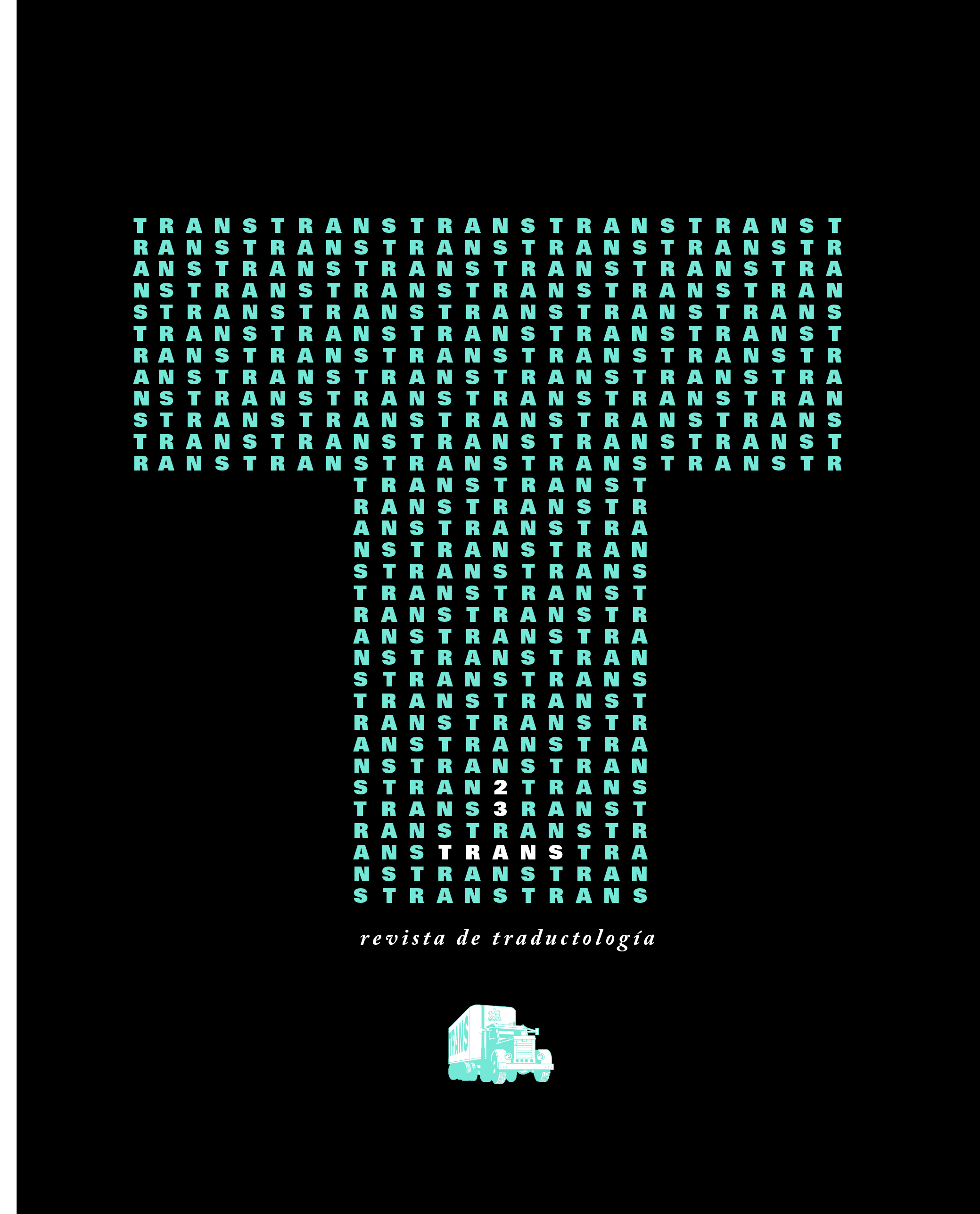Translation, Identity Negotiation and Symbolic Violence in a Migratory and Heterogeneous World: The case of «The Arrangers of Marriage», by Chimamanda Ngozi Adichie
DOI:
https://doi.org/10.24310/TRANS.2019.v0i23.5209Keywords:
migrations, symbolic violence, identity conflict, translation strategy, domestication, hybridityAbstract
We live in a world of migrations, where identity conflicts are increasingly frequent. The power asymmetries between different cultures and the symbolic violence resulting from them condition the attitudes of those who leave their homes to live in a new context. Translation becomes a tool for negotiation in these circumstances. This article will analyse the translation strategies of the characters in «The Arrangers of Marriager», a short story by Chimamanda Ngozi Adichie. In order to do so, we will apply a broad and interdisciplinary definition of translation, in the line of the latest advances in our field.
Downloads
Metrics
Publication Facts
Reviewer profiles N/A
Author statements
Indexed in
-
—
- Academic society
- N/A
- Publisher
- Universidad de Málaga
References
ADICHIE, Chimamanda Ngozi (2013): Americanah, Londres: 4th State.
ADICHIE, Chimamanda Ngozi (2017a) [2009]: «Imitation», en Chimamanda N. ADICHIE, The Thing Around Your Neck, Londres: 4th State, 22-42.
ADICHIE, Chimamanda Ngozi (2017b) [2009]: «The Arrangers of Marriage», en Chimamanda Ngozi ADICHIE, The Thing Around Your Neck, Londres: 4th State, 167-186.
ADICHIE, Chimamanda N. (2017c) [2009]: The Thing Around Your Neck, Londres: 4th State.
BAKER, Mona (2014): «The Changing Landscape of Translation and Interpreting Studies», en Sandra BERMANN y Catherine PORTER (eds.), A Companion to Translation Studies, Chinchester, Reino Unido: John Wiley & Sons, 15-27.
BARTHES, Roland ([1961] 2013): «Towards a Psychosociology of Contemporary Food Consumption», en Carole COUNIHAN y Penny VAN ESTERIK (eds.), Food and Culture: A Reader, Nueva York: Routledge, 23-30.
BASSNETT, Susan (2012): «Translation Studies at a Cross-Roads», Target, 24/1, 15-25, https://doi.org/10.1075/target.24.1.02bas
BASSNETT, Susan y David JOHNSTON (2018): «The Outward Turn», The Translator, Special Issue Call for Papers, abril 2018, http://explore.tandfonline.com/cfp/ah/rtrn-cfp-outwardturn
BAUMAN, Zygmunt (2017) [2000]: Modernidad líquida, trad. Mirta Rosenberg en colaboración con Jaime Arrambide Squirru, Oxford: Polity Press.
BECK, Ulrich y Elisabeth Gernsheim (2002): Individualization: Institutionalized Individualism and its Social and Political Consequences, Londres: Sage.
BHABHA, Homi K. (2004) [1994]: The Location of Culture, Londres y Nueva York: Routledge Classics.
BHABHA, Homi K. (1996): «Culture’s In-Between», en Stuart HALL y Paul DU GAY (eds.), Questions of Cultural Identity, Londres: Sage, 53-60.
BIELSA, Esperança y Susan BASSNETT (2009): Translation in Global News, Londres: Routledge.
BOURDIEU, Pierre (2000) [1998]: La dominación masculina, trad. Joaquín Jordá, Barcelona: Anagrama.
BUTLER, Judith, Ernesto LACLAU y Slavoj ŽIŽEK (2008): Contingency, Hegemony, Universality, Londres: Verso.
CHIARO, Delia y Linda ROSSATO (2015): «Food and Translation, Translation and Food», The Translator, 21/3, 237-243, https://doi.org/10.1080/13556509.2015.1110934
GENTZLER, Edwin (2017): Translation and Rewriting in the Age of Post-Translation Studies, Abingdon, Oxon, Reino Unido: Routledge.
HOUSE, Juliane (2016): Translation as Communication across Languages and Cultures, Londres y Nueva York: Routledge.
JAKOBSON, Roman (1959): «On Linguistic Aspects of Translation», en Reuben A. BROWER (ed.), On Translation, Cambridge (Estados Unidos): Harvard University Press, 232–239.
MEYLAERTS, Reine (2006): «Heterolingualism in/and Translation», Target 18/1, 1-15, https://doi.org/10.1075/target.18.1
NACIONES UNIDAS, Departamento de Economía y Asuntos Sociales, División de Poblaciones (2017): International Migration Report 2017, Nueva York: Naciones Unidas, http://www.un.org/en/development/desa/population/migration/publications/migrationreport/docs/MigrationReport2017.pdf
PRATT, Mary Louise (1992): Imperial Eyes: Travel Writing and Transculturation, Londres y Nueva York: Routledge.
ROBYNS, Clem (1994): «Translation and Discursive Identity», Poetics Today, 15/3, 405-428.
RODRÍGUEZ MURPHY, Elena (2015): Traducción y literatura africana: multilingüismo y transculturación en la narrativa nigeriana de expresión inglesa, Granada: Comares.
VIDAL, Mª Carmen África (2005): «Re-presenting the “Real”: Pierre Bourdieu and Legal Translation», The Translator, 11/2, 256-275, https://doi.org/10.1080/13556509.2005.10799201
VIDAL, Mª Carmen África (2015): «Traducir al atravesado», Papers. Revista de Sociología, 100/3, 345-363, http://dx.doi.org/10.5565/rev/papers.2143.
Downloads
Published
How to Cite
Issue
Section
License
All contents published in TRANS. Revista de Traductología are protected under the Creative Commons Attribution-NonCommercial-ShareAlike 4.0 International (CC BY-NC-SA 4.0) license. All about this license is available in the following link: <http://creativecommons.org/licenses/by-nc-sa/4.0>
Users can copy, use, redistribute, share and exhibit publicly as long as:
- The original source and authorship of the material are cited (Journal, Publisher and URL of the work).
- It is not used for comercial purposes.
- The existence of the license and its especifications are mentioned.
- ShareAlike — If you remix, transform, or build upon the material, you must distribute your contributions under the same license as the original.
There are two sets of authors’ rights: moral and property rights. Moral rights are perpetual prerogatives, unrenounceable, not-transferable, unalienable, imprescriptible and inembargable. According to authors’ rights legislation, TRANS. Revista de Traductología recognizes and respects authors moral rights, as well as the ownership of property rights, which will be transferred to University of Malaga in open access.
The property rights are referred to the benefits that are gained by the use or the dissemination of works. TRANS. Revista de Traductología is published in an open access form and it is exclusively licenced by any means for doing or authorising distribution, dissemination, reproduction, , adaptation, translation or arrangement of works.
Authors are responsable for obtaining the necessary permission to use copyrighted images.













21.png)
